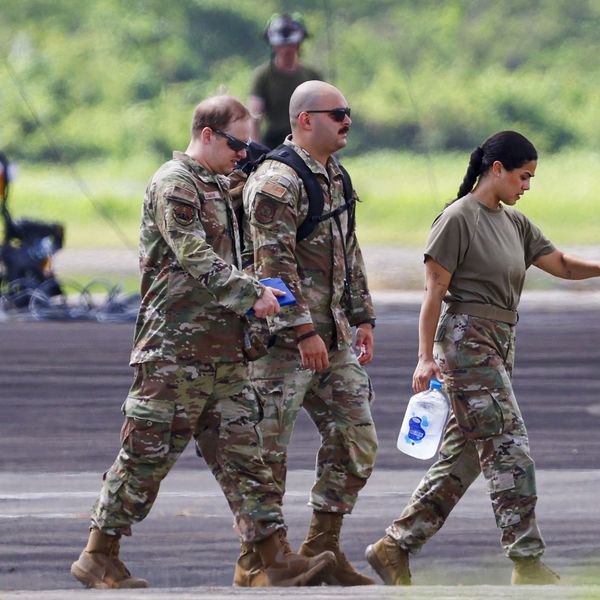US Raises Flag in Cuba After 54 Years, but 'Signs of Mistrust Linger'
Former Cuban leader Fidel Castro has called for the U.S. to repay millions of dollars owed to his country for damage done by its decades-long embargo
After over five decades, the U.S. embassy in Cuba formally re-opened with a flag-raising ceremony on Friday, marking another historic step in normalizing relations between the two countries.
"For more than half a century, U.S.-Cuba relations have been suspended in the amber of Cold War politics," Secretary of State John Kerry said in a speech at the seaside facility. "It's time to unfurl our flags and let the world know we wish each other well."
Kerry spoke, occasionally in Spanish, on a podium outside the embassy moments before U.S. Marines raised the American flag there for the first time in 54 years. The Cuban embassy in Washington, D.C., reopened in July.
But however landmark the event, tensions remain. The U.S. economic embargo against Cuba is still in place, and the U.S. prison at Guantanamo Bay remains open.
As global affairs correspondent Elise Labott wrote for CNN on Friday, "Signs of mistrust linger, and beyond the pomp and circumstance lies a long road back from more than half a century of diplomatic animosity."
On Thursday, which also happened to be his 89th birthday, former Cuban leader Fidel Castro called for the U.S. to repay millions of dollars owed to his country for damage done by its decades-long embargo--an embargo many on Capitol Hill are saying should end.
"The rhetoric from the leader of the Cuban revolution, and the face of anti-U.S. resistance, is not unexpected," Labott wrote. "But it underscores the long-standing tensions at play as Washington and Havana work to thaw the decades-long chill in relations."
And while Kerry stated that the U.S. remains "convinced that a genuine democracy would best serve the people of Cuba," that view is not necessarily shared by the Cuban people.
"Perhaps some dreamers and others who are superficial think this will be the end of socialism," former Cuban diplomat Eladio Aguiar told TeleSUR. "No, sir."
Earlier on Friday, Democracy Now! hosted scholar and writer Carlos Alzugaray Treto, a former Cuban diplomat, and author Peter Kornbluh, director of the Cuba Documentation Project at the National Security Archive at George Washington University, to further discuss the historical development, its potential ramifications, and the issues that still need to be addressed.
"I think that how we are looking at it is trying to get an answer to--the question is what kind of change this represents," Treto said. "Is this only a change of tactics to continue trying to overthrow the Cuban government by different means? I call it the Roberta Flack strategy--' killing me softly with your song'."
"On the other hand," he continued, "maybe we are seeing an important change of strategy by which the U.S. now is saying, 'OK, there is a legitimate government in Cuba. Everybody in the world has normal relations with Cuba. We should go for that because that's how we best serve American interests in Cuba in terms of trade, exchanges, and even the interest of the Cuban-American community."
Watch the segment below:
An Urgent Message From Our Co-Founder
Dear Common Dreams reader, The U.S. is on a fast track to authoritarianism like nothing I've ever seen. Meanwhile, corporate news outlets are utterly capitulating to Trump, twisting their coverage to avoid drawing his ire while lining up to stuff cash in his pockets. That's why I believe that Common Dreams is doing the best and most consequential reporting that we've ever done. Our small but mighty team is a progressive reporting powerhouse, covering the news every day that the corporate media never will. Our mission has always been simple: To inform. To inspire. And to ignite change for the common good. Now here's the key piece that I want all our readers to understand: None of this would be possible without your financial support. That's not just some fundraising cliche. It's the absolute and literal truth. We don't accept corporate advertising and never will. We don't have a paywall because we don't think people should be blocked from critical news based on their ability to pay. Everything we do is funded by the donations of readers like you. Will you donate now to help power the nonprofit, independent reporting of Common Dreams? Thank you for being a vital member of our community. Together, we can keep independent journalism alive when it’s needed most. - Craig Brown, Co-founder |
After over five decades, the U.S. embassy in Cuba formally re-opened with a flag-raising ceremony on Friday, marking another historic step in normalizing relations between the two countries.
"For more than half a century, U.S.-Cuba relations have been suspended in the amber of Cold War politics," Secretary of State John Kerry said in a speech at the seaside facility. "It's time to unfurl our flags and let the world know we wish each other well."
Kerry spoke, occasionally in Spanish, on a podium outside the embassy moments before U.S. Marines raised the American flag there for the first time in 54 years. The Cuban embassy in Washington, D.C., reopened in July.
But however landmark the event, tensions remain. The U.S. economic embargo against Cuba is still in place, and the U.S. prison at Guantanamo Bay remains open.
As global affairs correspondent Elise Labott wrote for CNN on Friday, "Signs of mistrust linger, and beyond the pomp and circumstance lies a long road back from more than half a century of diplomatic animosity."
On Thursday, which also happened to be his 89th birthday, former Cuban leader Fidel Castro called for the U.S. to repay millions of dollars owed to his country for damage done by its decades-long embargo--an embargo many on Capitol Hill are saying should end.
"The rhetoric from the leader of the Cuban revolution, and the face of anti-U.S. resistance, is not unexpected," Labott wrote. "But it underscores the long-standing tensions at play as Washington and Havana work to thaw the decades-long chill in relations."
And while Kerry stated that the U.S. remains "convinced that a genuine democracy would best serve the people of Cuba," that view is not necessarily shared by the Cuban people.
"Perhaps some dreamers and others who are superficial think this will be the end of socialism," former Cuban diplomat Eladio Aguiar told TeleSUR. "No, sir."
Earlier on Friday, Democracy Now! hosted scholar and writer Carlos Alzugaray Treto, a former Cuban diplomat, and author Peter Kornbluh, director of the Cuba Documentation Project at the National Security Archive at George Washington University, to further discuss the historical development, its potential ramifications, and the issues that still need to be addressed.
"I think that how we are looking at it is trying to get an answer to--the question is what kind of change this represents," Treto said. "Is this only a change of tactics to continue trying to overthrow the Cuban government by different means? I call it the Roberta Flack strategy--' killing me softly with your song'."
"On the other hand," he continued, "maybe we are seeing an important change of strategy by which the U.S. now is saying, 'OK, there is a legitimate government in Cuba. Everybody in the world has normal relations with Cuba. We should go for that because that's how we best serve American interests in Cuba in terms of trade, exchanges, and even the interest of the Cuban-American community."
Watch the segment below:
After over five decades, the U.S. embassy in Cuba formally re-opened with a flag-raising ceremony on Friday, marking another historic step in normalizing relations between the two countries.
"For more than half a century, U.S.-Cuba relations have been suspended in the amber of Cold War politics," Secretary of State John Kerry said in a speech at the seaside facility. "It's time to unfurl our flags and let the world know we wish each other well."
Kerry spoke, occasionally in Spanish, on a podium outside the embassy moments before U.S. Marines raised the American flag there for the first time in 54 years. The Cuban embassy in Washington, D.C., reopened in July.
But however landmark the event, tensions remain. The U.S. economic embargo against Cuba is still in place, and the U.S. prison at Guantanamo Bay remains open.
As global affairs correspondent Elise Labott wrote for CNN on Friday, "Signs of mistrust linger, and beyond the pomp and circumstance lies a long road back from more than half a century of diplomatic animosity."
On Thursday, which also happened to be his 89th birthday, former Cuban leader Fidel Castro called for the U.S. to repay millions of dollars owed to his country for damage done by its decades-long embargo--an embargo many on Capitol Hill are saying should end.
"The rhetoric from the leader of the Cuban revolution, and the face of anti-U.S. resistance, is not unexpected," Labott wrote. "But it underscores the long-standing tensions at play as Washington and Havana work to thaw the decades-long chill in relations."
And while Kerry stated that the U.S. remains "convinced that a genuine democracy would best serve the people of Cuba," that view is not necessarily shared by the Cuban people.
"Perhaps some dreamers and others who are superficial think this will be the end of socialism," former Cuban diplomat Eladio Aguiar told TeleSUR. "No, sir."
Earlier on Friday, Democracy Now! hosted scholar and writer Carlos Alzugaray Treto, a former Cuban diplomat, and author Peter Kornbluh, director of the Cuba Documentation Project at the National Security Archive at George Washington University, to further discuss the historical development, its potential ramifications, and the issues that still need to be addressed.
"I think that how we are looking at it is trying to get an answer to--the question is what kind of change this represents," Treto said. "Is this only a change of tactics to continue trying to overthrow the Cuban government by different means? I call it the Roberta Flack strategy--' killing me softly with your song'."
"On the other hand," he continued, "maybe we are seeing an important change of strategy by which the U.S. now is saying, 'OK, there is a legitimate government in Cuba. Everybody in the world has normal relations with Cuba. We should go for that because that's how we best serve American interests in Cuba in terms of trade, exchanges, and even the interest of the Cuban-American community."
Watch the segment below:

